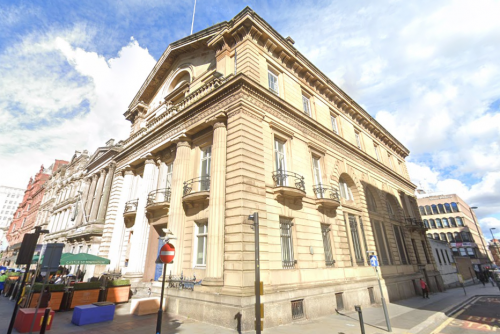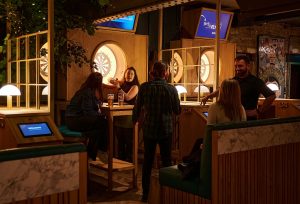Council approval for The Ivy Brasserie to open in former Bank of England building

Liverpool City Council has granted full planning permission to convert the city’s former Bank of England building in Castle Street into a new The Ivy restaurant.
London-based Troia (UK) Restaurants submitted an application in early May this year. It would complement two other Ivy sites already established in Manchester.
The planning committee approved plans to develop a restaurant within the Grade I-listed building in August last year when Liverpool-based property company JSM Group was behind the scheme to attract a high-end restaurant, which won unanimous approval.
The Ivy Brasserie will open seven days a week and will offer a full service from breakfast through to dinner.
The menu will feature contemporary and classic signature dishes from the Ivy’s extensive menu and has been designed to meet the needs and desires of any occasion, said Troia.
It said its restaurants contribute to the vitality and viability of the centres in which they are located throughout the day and into the night-time.
In a submission to the council, it said: “Troia are looking to bring life back into this Grade I-listed building which has sadly sat vacant for a significant number of years.”
The distinctive building, which originally opened in 1848, sits within the Castle Street Conservation Area.
The plan is to convert the ground floor into restaurant/bar use, along with a commercial kitchen.
The basement level will provide further storage, office, staff break and changing spaces, while the first floor is to be used for customer toilets.
The second and third floor are to remain unused, and the rear enclosed bullion yard no longer forms part of the application site.
The site was built in a Neoclassical style and was constructed as one of three branch banks for the Bank of England in the mid-19th century.
It is regarded as one of architect Charles Robert Cockerell’s most impressive and was described by Nikolaus Pevsner as a “masterpiece of Victorian architecture” and by the National Heritage List for England as “one of Cockerell’s richest and most inventive buildings.”
The Bank of England closed its Liverpool branch on November 28, 1986, and it was intended to reopen as a restaurant in 1988 following an approved change of use application. Despite this, the site has remained empty and available for lease until at least 2021.
It was occupied in April 2015 by ‘Love Activists’ in a protest over the provision of shelter and accommodation for the city’s homeless.
Five protesters were subsequently jailed for almost three months in September that year on trespass charges.
Proposals for the Ivy scheme were submitted to Liverpool City Council by Cirencester-based full-service development consultancy, Pegasus Group, on behalf of Troia (UK) Restaurants.
Pegasus, which has 13 offices around the UK, has consulted on several schemes for Troia (UK) Restaurants.
A spokesperson for Pegasus Group said: “Liverpool has an array of beautiful, historic buildings and we’re very pleased to have played our part in bringing 31 Castle Street back to life.
“The Ivy is much-loved across the UK and this new operation will further bolster the city’s burgeoning premium hospitality offering.
“We would like to thank the officers at Liverpool City Council for being pro-active both at pre-application stage and during the determination of the applications and will look upon the transformation of this building with particular interest and excitement.”








